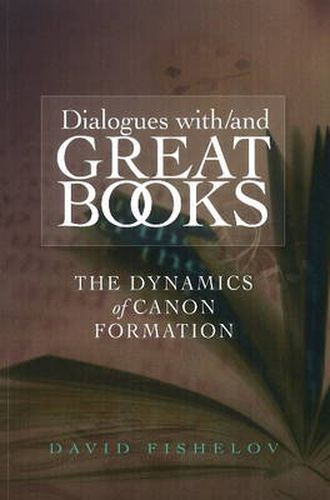Readings Newsletter
Become a Readings Member to make your shopping experience even easier.
Sign in or sign up for free!
You’re not far away from qualifying for FREE standard shipping within Australia
You’ve qualified for FREE standard shipping within Australia
The cart is loading…






What is the source of a book’s perceived greatness and why do certain books become part of the accepted canon? This book presents a fresh perspective on these questions, revisiting prevalent approaches that explain a work’s reputation in terms of its aesthetic qualities ( the beauty view ) or as the result of dictates by social hegemonies ( the power view ). Fishelov argues that the most important source of a book’s perceived greatness is the number and variety of echoes and dialogues which it generates with readers, authors, translators, adapters, artists and critics. Part I ( What is a Dialogue? What is a Great Book ) provides useful distinctions between different kinds of dialogue (genuine dialogue, dialogue-of-the-deaf and echo-dialogue), develops theoretical arguments (why the dialogic approach is not circular), and empirically tests intriguing cases (why has Candide, and not Rasselas won the race for literary fame?). Part II ( Genuine Dialogues with Great Books ) presents in-depth readings of literary and artistic dialogues with well established canonical works including Monty Python’s The Life of Brian, Swift’s distortion of More’s Utopia and some modern adaptations of Ovid’s Pygmalion and provides an opportunity to examine the process by which dialogues contribute to a work’s reputation. Innumerable illustrations of Robinson Crusoe, an operetta based on Voltaire’s Candide, DeMille’s cinematic version of the biblical story of Samson and Delilah, a contemporary song that quotes lines from Horace also illustrate the vital role played by artists outside of the literary field in making certain works stand out as masterpieces. Through its special blend of theoretical arguments, empirical methods and sensitive interpretations, Dialogues with/and Great Books offers a stimulating invitation to re-think the concepts of Literary Canon and Intertextuality, as well as the intricate connections between the two.
$9.00 standard shipping within Australia
FREE standard shipping within Australia for orders over $100.00
Express & International shipping calculated at checkout
What is the source of a book’s perceived greatness and why do certain books become part of the accepted canon? This book presents a fresh perspective on these questions, revisiting prevalent approaches that explain a work’s reputation in terms of its aesthetic qualities ( the beauty view ) or as the result of dictates by social hegemonies ( the power view ). Fishelov argues that the most important source of a book’s perceived greatness is the number and variety of echoes and dialogues which it generates with readers, authors, translators, adapters, artists and critics. Part I ( What is a Dialogue? What is a Great Book ) provides useful distinctions between different kinds of dialogue (genuine dialogue, dialogue-of-the-deaf and echo-dialogue), develops theoretical arguments (why the dialogic approach is not circular), and empirically tests intriguing cases (why has Candide, and not Rasselas won the race for literary fame?). Part II ( Genuine Dialogues with Great Books ) presents in-depth readings of literary and artistic dialogues with well established canonical works including Monty Python’s The Life of Brian, Swift’s distortion of More’s Utopia and some modern adaptations of Ovid’s Pygmalion and provides an opportunity to examine the process by which dialogues contribute to a work’s reputation. Innumerable illustrations of Robinson Crusoe, an operetta based on Voltaire’s Candide, DeMille’s cinematic version of the biblical story of Samson and Delilah, a contemporary song that quotes lines from Horace also illustrate the vital role played by artists outside of the literary field in making certain works stand out as masterpieces. Through its special blend of theoretical arguments, empirical methods and sensitive interpretations, Dialogues with/and Great Books offers a stimulating invitation to re-think the concepts of Literary Canon and Intertextuality, as well as the intricate connections between the two.